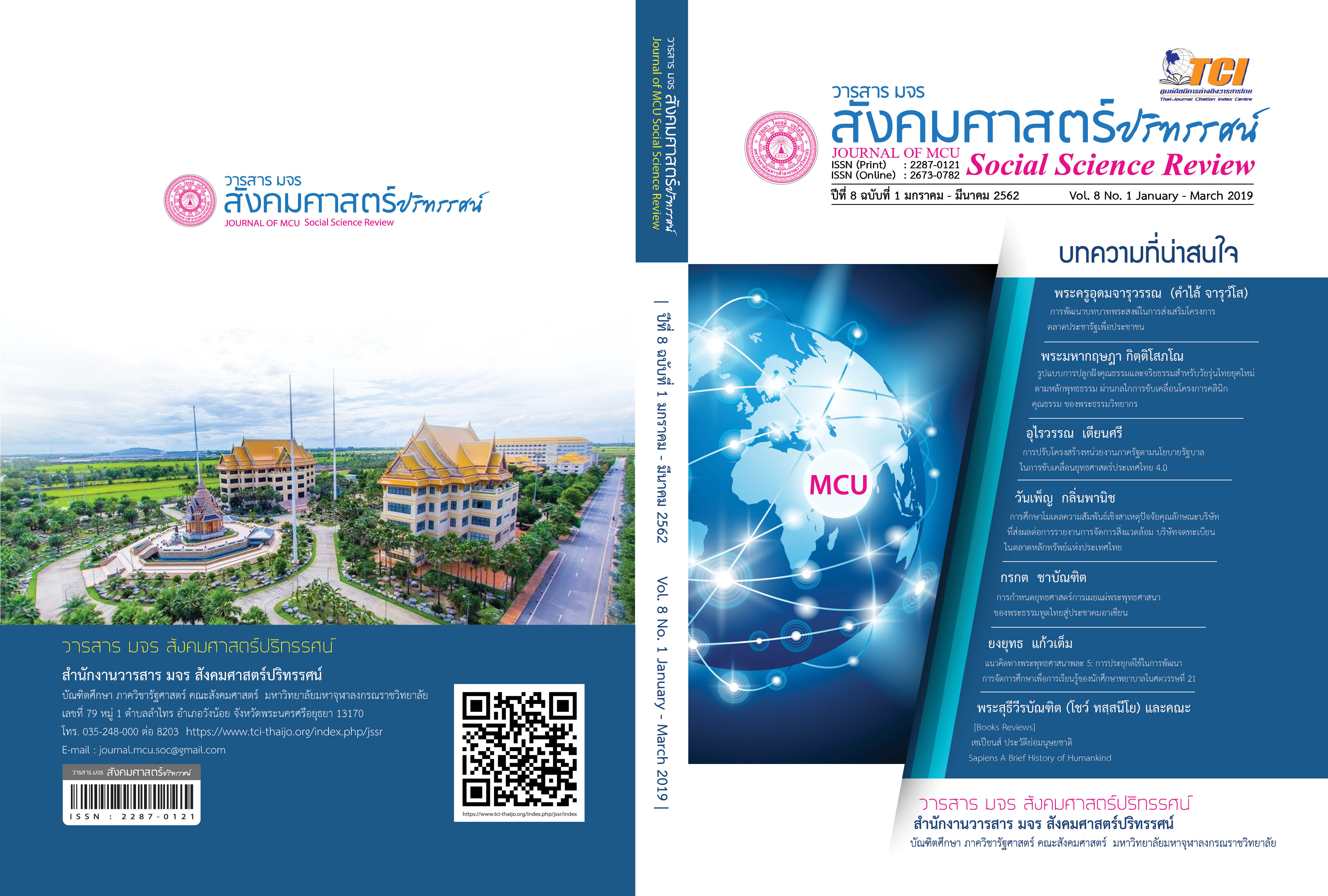การสื่อสารทางการเมืองเพื่อสถานะภิกษุณีในประเทศไทย: ศึกษากรณีภิกษุณีธัมมนันทา
คำสำคัญ:
กระบวนการสื่อสารทางการเมือง, สถานะภิกษุณีบทคัดย่อ
บทความวิจัยนี้มีวัตถุประสงค์ 1) เพื่อศึกษาบริบททางการเมืองที่มีผลต่อการสื่อสารทางการเมืองเรื่องสถานะภิกษุณีในประเทศไทย 2) เพื่อศึกษากระบวนการสื่อสารทางการเมืองของภิกษุณีธัมมนันทาในการต่อสู้เพื่อสถานะภิกษุณีในประเทศไทย
การวิจัยครั้งนี้เป็นการวิจัยในเชิงคุณภาพ โดยมีการอธิบายและนำทฤษฎีการสื่อสารของเดวิด เค เบอร์โล (David K. Berlo) ทฤษฎีการสื่อสารทางการเมืองของไบรอัน แมคแนร์ (Brian McNair) มาเป็นหลักในการศึกษา โดยได้เก็บข้อมูลด้วยการสัมภาษณ์แบบเชิงลึก การค้นคว้าวิจัยจากเอกสารทางวิชาการ
ผลการวิจัยพบว่า
1.บริบททางการเมืองในช่วงปี พ.ศ.2544-2559 ส่งผลเป็นอย่างมากต่อกระบวนการสื่อสารทางการเมืองเพื่อสถานะภิกษุณีในประเทศไทยของภิกษุณีธัมมนันทา ท่านเป็นหญิงไทยคนแรกที่ได้บวชเป็นภิกษุณีตามเถรวาทนิกายที่ประเทศศรีลังกาเมื่อ 28 กุมภาพันธ์ พ.ศ.2546 ท่านเป็นเจ้าอาวาสวัตรทรงธรรมกัลยาณี ที่ได้ทำการบวชให้กับสตรีที่ต้องการบวชเป็นภิกษุณี ในเรื่องนี้มหาเถรสมาคมได้มีมติห้ามมิให้มีการบวชภิกษุณีขึ้นในประเทศไทย
2.ผู้วิจัยได้พบว่ากระบวนการสื่อสารทางการเมืองเพื่อสถานะภิกษุณีในประเทศไทยของภิกษุณีธัมมนันทาเป็นไปตามทฤษฎีการสื่อสารของเดวิด เค เบอร์โล และทฤษฎีการสื่อสารของไบรอัน แมคแนร์ ท่านมีคุณสมบัติเพียบพร้อมในฐาน ‘ผู้ส่งสาร’ เนื่องจากท่านได้ปริญญาเอกด้านศาสนาพุทธ อดีตอาจารย์มหาวิทยาลัยที่มีประสบการณ์การค้นคว้าวิจัยด้านพุทธศาสนา นอกจากนี้ท่านยังได้รับการบ่มเพาะจากมารดาของท่านซึ่งได้บวชเป็นภิกษุณีในนิกายมหายานจากประเทศไต้หวันเมื่อ พ.ศ.2514 ดังนั้น ‘สาร’ ที่ท่านสื่อออกมาจึงมุ่งให้สาธารณชนตระหนักถึงสถานะที่ต่ำต้อยของภิกษุณี และมุ่งรณรงค์ให้นานาชาติให้การยอมรับ ภิกษุณีธัมมนันทามีผลงานที่เป็นข้อเขียนมากมายที่ได้สื่อสารออกไปหลาย ‘ช่องทางการสื่อสาร’ ทั้งสื่อหลักและสื่อใหม่ ‘ผู้รับสาร’ ของธัมมนันทามีอาทิ กลุ่มพระภิกษุสงฆ์ องค์กรศาสนา และมหาเถรสมาคม กลุ่มภิกษุณีสงฆ์ แม่ชี และองค์กรสตรี กลุ่มนักวิชาการ และปัญญาชน กลุ่มสื่อมวลชน กลุ่มประชาชนและญาติธรรมทั่วไป
ข้อสังเคราะห์จากวิจัยซึ่งเป็นองค์ความรู้ใหม่ในการสื่อสารทางการเมืองสรุปได้ดังนี้ 1)การสื่อสารเพื่อสถานะภิกษุณีในประเทศไทยจะประสบความสำเร็จต้องส่งเสริมให้สตรีมีพลัง มีขบวนการที่เป็นเอกภาพและกว้างขวางมากขึ้น 2)การต่อสู้เพื่อสถานะของภิกษุณีในไทยสะท้อนให้เห็นความไม่เท่าเทียมกันในระบบสังคมและวัฒนธรรมไทย 3)การเรียกร้องสถานะภิกษุณีจะต้องเกิดจากศรัทธามหาชน จึงสัมฤทธิ์ผล 4)ความเป็นผู้กล้าท้าทายขนบทางศาสนา อาจนำพาความเปลี่ยนแปลงสู่สังคมไทย 5)การรับรู้เนื้อหาของสาร อาจส่งผลกระทบในเชิงบวกหรือเชิงลบขึ้นอยู่กับทัศนคติของผู้รับสาร
เอกสารอ้างอิง
Berlo David K. (1960). “The Process of Communication”. New York: Holt Rinehart & Winston Inc.
Chatkul Na Ayuthaya Sakdina. (1998). Cheewit Naewkid lae Karn Thorsu Khong Narin Kung Khon Kwang Lok. Bangkok: Matichon.
Jirayusawad Thanomsak. (2009). Sen Thang Su Fun Nayokrathamontree Khonti 27 Abhisith Vessasiwa. Bangkok: Phanyachon.
Khao Sod Editorial Board. (2010). “BunthekPlutsapha 53 Kwamchingjak Khansod KwamTai 90 Sop”. Bangkok. Khaosod.
King Prajadhipok's Institute. (2007). “Rathathummanoon hang rachaanajakthai Phutsakarad 2550” Nonthaburi: King Prajadhipok's Institute.
Lasswell, Harold D. (1966). “The Structure and Function of Communication in Society”. Public Opinion and Communication” New York : Free press.
ดาวน์โหลด
เผยแพร่แล้ว
รูปแบบการอ้างอิง
ฉบับ
ประเภทบทความ
สัญญาอนุญาต
ลิขสิทธิ์ (c) 2019 วารสาร มจร สังคมศาสตร์ปริทรรศน์

อนุญาตภายใต้เงื่อนไข Creative Commons Attribution-NonCommercial-NoDerivatives 4.0 International License.
เพื่อให้เป็นไปตามกฎหมายลิขสิทธิ์ ผู้นิพนธ์ทุกท่านต้องลงลายมือชื่อในแบบฟอร์มใบมอบลิขสิทธิ์บทความให้แก่วารสารฯ พร้อมกับบทความต้นฉบับที่ได้แก้ไขครั้งสุดท้าย นอกจากนี้ ผู้นิพนธ์ทุกท่านต้องยืนยันว่าบทความต้นฉบับที่ส่งมาตีพิมพ์นั้น ได้ส่งมาตีพิมพ์เฉพาะในวารสาร มจร สังคมศาสตร์ปริทรรศน์ เพียงแห่งเดียวเท่านั้น หากมีการใช้ภาพหรือตารางหรือเนื้อหาอื่นๆ ของผู้นิพนธ์อื่นที่ปรากฏในสิ่งตีพิมพ์อื่นมาแล้ว ผู้นิพนธ์ต้องขออนุญาตเจ้าของลิขสิทธิ์ก่อน พร้อมทั้งแสดงหนังสือที่ได้รับการยินยอมต่อบรรณาธิการ ก่อนที่บทความจะได้รับการตีพิมพ์ หากไม่เป็นไปตามข้อกำหนดเบื้องต้น ทางวารสารจะถอดบทความของท่านออกโดยไม่มีข้อยกเว้นใดๆ ทั้งสิ้น





